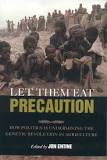Let Them Eat Precaution
Let Them Eat Precaution: How Politics Is Undermining the Genetic Revolution in Agriculture is a book that delves into the complex interplay between politics, genetic engineering in agriculture, and food security. Authored by Jon Entine, the book critically examines the opposition to genetically modified (GM) crops and argues that such opposition is largely based on unfounded fears and political motivations rather than scientific evidence. Entine posits that the precautionary principle, often cited by critics of GM crops, is being misapplied in a way that stifles innovation and hampers the potential benefits of genetic engineering in agriculture.
Overview[edit | edit source]
The book is structured around the premise that genetic engineering offers a promising avenue for addressing some of the world's most pressing issues, including food security, nutrition, and environmental sustainability. Entine explores the scientific consensus on the safety and efficacy of GM crops, contrasting it with the public perception, which is often shaped by misinformation and a lack of understanding of the science involved.
Through a series of case studies and analyses, Let Them Eat Precaution highlights the benefits that GM crops have already brought to various parts of the world, such as increased crop yields, reduced pesticide use, and enhanced nutritional content. It also addresses the concerns raised by critics of GM technology, including issues related to biodiversity, the monopolization of seed markets by large corporations, and the potential for unforeseen environmental impacts.
Themes[edit | edit source]
The book touches on several key themes, including:
- The precautionary principle and its application in the context of GM crops.
- The gap between the scientific consensus on GM crops and public perception.
- The role of politics and activism in shaping policies and attitudes towards genetic engineering in agriculture.
- The potential of genetic engineering to contribute to food security, environmental sustainability, and economic development.
Reception[edit | edit source]
Let Them Eat Precaution has sparked debate among various stakeholders, including scientists, policymakers, environmental activists, and the general public. Supporters of the book appreciate its call for a more science-based approach to policy-making in the realm of genetic engineering. Critics, on the other hand, argue that it downplays legitimate concerns about the risks and ethical implications of GM crops.
Conclusion[edit | edit source]
Jon Entine's Let Them Eat Precaution is a provocative exploration of the controversies surrounding genetic engineering in agriculture. By advocating for a balanced, evidence-based approach to the development and regulation of GM crops, the book contributes to a critical conversation about how best to harness the potential of genetic engineering to meet global challenges.
| Let Them Eat Precaution Resources | |
|---|---|
|
|
Search WikiMD
Ad.Tired of being Overweight? Try W8MD's physician weight loss program.
Semaglutide (Ozempic / Wegovy and Tirzepatide (Mounjaro / Zepbound) available.
Advertise on WikiMD
|
WikiMD's Wellness Encyclopedia |
| Let Food Be Thy Medicine Medicine Thy Food - Hippocrates |
Translate this page: - East Asian
中文,
日本,
한국어,
South Asian
हिन्दी,
தமிழ்,
తెలుగు,
Urdu,
ಕನ್ನಡ,
Southeast Asian
Indonesian,
Vietnamese,
Thai,
မြန်မာဘာသာ,
বাংলা
European
español,
Deutsch,
français,
Greek,
português do Brasil,
polski,
română,
русский,
Nederlands,
norsk,
svenska,
suomi,
Italian
Middle Eastern & African
عربى,
Turkish,
Persian,
Hebrew,
Afrikaans,
isiZulu,
Kiswahili,
Other
Bulgarian,
Hungarian,
Czech,
Swedish,
മലയാളം,
मराठी,
ਪੰਜਾਬੀ,
ગુજરાતી,
Portuguese,
Ukrainian
Medical Disclaimer: WikiMD is not a substitute for professional medical advice. The information on WikiMD is provided as an information resource only, may be incorrect, outdated or misleading, and is not to be used or relied on for any diagnostic or treatment purposes. Please consult your health care provider before making any healthcare decisions or for guidance about a specific medical condition. WikiMD expressly disclaims responsibility, and shall have no liability, for any damages, loss, injury, or liability whatsoever suffered as a result of your reliance on the information contained in this site. By visiting this site you agree to the foregoing terms and conditions, which may from time to time be changed or supplemented by WikiMD. If you do not agree to the foregoing terms and conditions, you should not enter or use this site. See full disclaimer.
Credits:Most images are courtesy of Wikimedia commons, and templates Wikipedia, licensed under CC BY SA or similar.
Contributors: Prab R. Tumpati, MD

